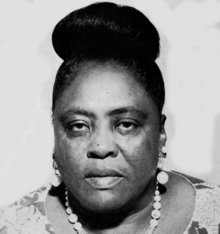
Back فاني لو هامر Arabic Fannie Lou Hamer Catalan Fannie Lou Hamer German Fannie Lou Hamer Spanish فانی لوه هامر Persian Fannie Lou Hamer French פאני לו היימר HE Fannie Lou Hamer ID Fannie Lou Hamer Italian ファニー・ルー・ヘイマー Japanese
Fannie Lou Hamer | |
|---|---|
 Hamer in 1971 | |
| Born | Fannie Lou Townsend October 6, 1917 |
| Died | March 14, 1977 (aged 59) Mound Bayou, Mississippi, U.S. |
| Burial place | Ruleville, Mississippi, U.S. |
| Organization(s) | National Women's Political Caucus Student Nonviolent Coordinating Committee National Council of Negro Women |
| Known for | Civil rights leader |
| Title | Vice chairwoman of Freedom Democratic Party; Co-founder of National Women's Political Caucus |
| Political party | Freedom Democratic Party |
| Movement | Civil rights movement Women's rights |
| Spouse | Perry "Pap" Hamer |
| Children | 4 |
| Awards | Inductee of the National Women's Hall of Fame |
Fannie Lou Hamer (/ˈheɪmər/; née Townsend; October 6, 1917 – March 14, 1977) was an American voting and women's rights activist, community organizer, and a leader in the civil rights movement. She was the vice-chair of the Freedom Democratic Party, which she represented at the 1964 Democratic National Convention. Hamer also organized Mississippi's Freedom Summer along with the Student Nonviolent Coordinating Committee (SNCC). She was also a co-founder of the National Women's Political Caucus, an organization created to recruit, train, and support women of all races who wish to seek election to government office.[1]
Hamer began civil rights activism in 1962, continuing until her health declined nine years later. She was known for her use of spiritual hymns and quotes and her resilience in leading the civil rights movement for black women in Mississippi. She was extorted, threatened, harassed, shot at, and assaulted by racists, including members of the police, while trying to register for and exercise her right to vote. She later helped and encouraged thousands of African-Americans in Mississippi to become registered voters and helped hundreds of disenfranchised people in her area through her work in programs like the Freedom Farm Cooperative. She unsuccessfully ran for the U.S. Senate in 1964, losing to John C. Stennis, and the Mississippi State Senate in 1971. In 1970, she led legal action against the government of Sunflower County, Mississippi for continued illegal segregation.
Hamer died on March 14, 1977, aged 59, in Mound Bayou, Mississippi. Her memorial service was widely attended and her eulogy was delivered by U.S. Ambassador to the United Nations Andrew Young.[2] She was posthumously inducted into the National Women's Hall of Fame in 1993. On January 4, 2025, President Joe Biden awarded Hamer the Presidential Medal of Freedom posthumously.[3][4]
- ^ Brown, DeNeen (October 6, 2017). "Civil rights crusader Fannie Lou Hamer defied men—and presidents—who tried to silence her". The Washington Post. Retrieved March 6, 2020.
- ^ Johnson, Thomas A. (March 21, 1977). "Young Eulogizes Fannie L. Hamer, Mississippi Civil Rights Champion". The New York Times. ISSN 0362-4331. Archived from the original on February 26, 2018. Retrieved February 24, 2018.
- ^ Today, Mississippi (January 4, 2025). "Fannie Lou Hamer receives Presidential Medal of Freedom". Mississippi Today. Retrieved January 4, 2025.
- ^ "Biden's Medal of Freedom list: Hillary Clinton and Denzel Washington among honorees". ABC7 Los Angeles. January 4, 2025. Retrieved January 4, 2025.